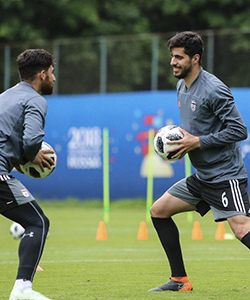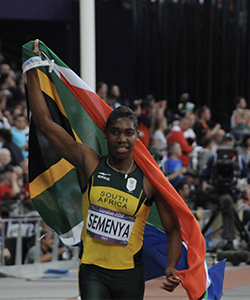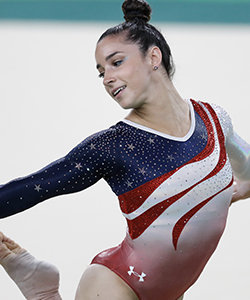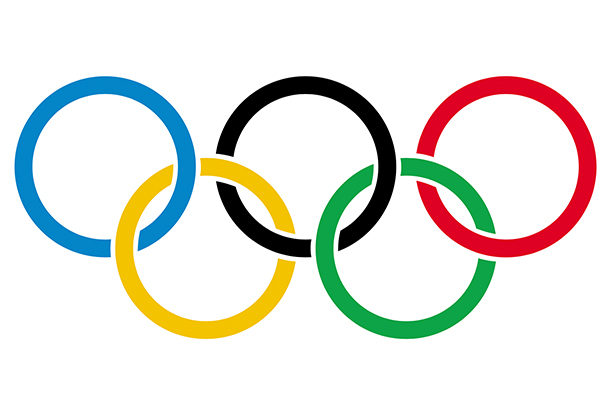As people everywhere pay more attention to the increasing negative impacts sport has had on individuals and communities, the IOC is seeking legitimacy for its reputation on human rights from the world’s top human rights official. The High Commissioner will need to send a clear message about the work the IOC and other sport governing bodies must do to leave a positive legacy for human rights, both by directly addressing the harms within their own control and by using their vast economic leverage to influence the remediation of harms connected to their operations.
With the FIFA World Cup happening right now in Russia and the launch of the Centre for Sport and Human Rights later this month in Geneva, sports governing bodies, like FIFA, the IOC, and others, are under the microscope for how they use their leverage to respect the rights of people most affected by sport.
These five examples illustrate cases in which sport bodies have direct or indirect say in addressing human rights harms. These cases should be raised in the dialogue between the IOC president and High Commissioner next week and evaluated for what the relevant sport body did or did not do to live by their own values and by international human rights standards.
The game is far from won for Sport and Human Rights. The starting whistle only just blew.
Paolo Guerrero, Captain of the Peruvian men’s national football team, @SeleccionPeru
.jpg) Peru has waited 36 years for its men’s football team to qualify again for the FIFA World Cup. After finally getting their shot, la Blanquirroja were nearly forced to play this month in Russia without star striker and team captain Paolo Guerrero. Guerrero is the latest in a long line of athletes who, though accused neither of cheating nor unwittingly benefitting from a performance enhancing effect, still suffer harsh penalties under the World Anti-Doping Agency (WADA) Code for testing positive to a ‘prohibited’ substance. Had the Swiss supreme court not granted temporary stay of Guerrero’s 14-month ban, the punishment would have irreversibly damaged his career and negatively affected his team and their supporters. This was a manifestly unjust and disproportionate penalty for testing positive for small traces of a metabolite found in Peruvian cocoa tea, which Guerrero maintained he accidentally consumed from a different tea brewed in the same pot. Although multiple appeal bodies believed Guerrero’s account, he still received nearly the maximum penalty under the WADA Code for his type of case.
Peru has waited 36 years for its men’s football team to qualify again for the FIFA World Cup. After finally getting their shot, la Blanquirroja were nearly forced to play this month in Russia without star striker and team captain Paolo Guerrero. Guerrero is the latest in a long line of athletes who, though accused neither of cheating nor unwittingly benefitting from a performance enhancing effect, still suffer harsh penalties under the World Anti-Doping Agency (WADA) Code for testing positive to a ‘prohibited’ substance. Had the Swiss supreme court not granted temporary stay of Guerrero’s 14-month ban, the punishment would have irreversibly damaged his career and negatively affected his team and their supporters. This was a manifestly unjust and disproportionate penalty for testing positive for small traces of a metabolite found in Peruvian cocoa tea, which Guerrero maintained he accidentally consumed from a different tea brewed in the same pot. Although multiple appeal bodies believed Guerrero’s account, he still received nearly the maximum penalty under the WADA Code for his type of case.
The Swiss federal judge wrote in her judgment that Guerrero benefited from a “rare surge of solidarity” to support his case, which included a letter from FIFPro, the world footballers union, that was signed by the team captains of Peru’s three World Cup opponents in Group C: Australia, Denmark, and France. Such solidarity should not be seen as a rare occurrence in anti-doping. Instead, the right for athletes to collectively bargain should be baked into the rule-making process. The current WADA Code has been imposed and updated without proper consultation with athletes and their legitimate representatives. FIFA, WADA, and other associated sport bodies should resolve to make Guerrero’s case the last miscarriage of justice in the name of catching cheats. They should drop the extended ban and work with all relevant stakeholders to ensure that anti-doping rules follow the rules of international human rights and labour rights, so that they serve the best interests of the game and protect the fundamental rights of athletes.
Team Melli, Iran’s men’s national football team, @TeamMelliIran
 For 38 years, women in Iran have been banned from entering stadiums to watch men play sports. Out of the 32 teams playing in the FIFA World Cup this month, Iran is alone in banning women spectators at home, and thus far FIFA has refused to enforce its own rules under Article 4 of FIFA’s statutes, which states that “discrimination of any kind… is strictly prohibited and punishable by suspension or expulsion.” In fact, FIFA had a front-row seat to one of the most dramatic days in the history of this discriminatory ban. On 1 March 2018, 35 women and girls were arrested outside the 100,000-seat Azadi Stadium in Tehran trying to buy tickets to watch the annual Derby Day football match between top national football clubs Esteghlal and Persepolis. Inside the stadium were 95,000 men, including FIFA President Gianni Infantino. The next day, Infantino was photographed with Iranian President Hassan Rouhani and accepted his vague promise that someday women would be allowed into football stadia, the same promise that Rouhani made to former FIFA President Sepp Blatter in 2013. There is still no clue of how long they will wait. This practice is not written into law, so it is not that difficult or time-consuming to overturn.
For 38 years, women in Iran have been banned from entering stadiums to watch men play sports. Out of the 32 teams playing in the FIFA World Cup this month, Iran is alone in banning women spectators at home, and thus far FIFA has refused to enforce its own rules under Article 4 of FIFA’s statutes, which states that “discrimination of any kind… is strictly prohibited and punishable by suspension or expulsion.” In fact, FIFA had a front-row seat to one of the most dramatic days in the history of this discriminatory ban. On 1 March 2018, 35 women and girls were arrested outside the 100,000-seat Azadi Stadium in Tehran trying to buy tickets to watch the annual Derby Day football match between top national football clubs Esteghlal and Persepolis. Inside the stadium were 95,000 men, including FIFA President Gianni Infantino. The next day, Infantino was photographed with Iranian President Hassan Rouhani and accepted his vague promise that someday women would be allowed into football stadia, the same promise that Rouhani made to former FIFA President Sepp Blatter in 2013. There is still no clue of how long they will wait. This practice is not written into law, so it is not that difficult or time-consuming to overturn.
Five of the players on Team Melli’s World Cup roster belong to either Esteghlal and Persepolis: 21-year-old defender Majid Hosseini, 24-year-old defender Rouzbeh Cheshmi, 24-year-old defender Pejman Montazeri, 30-year-old midfielder Omid Ebrahimi, and 30-year-old midfielder Vahid Amiri. These players also paid a heavy price on Derby Day, knowing that their mothers, sisters, wives, and daughters were locked out of watching them play in the stadium based solely on their gender. Many of their fellow national team players compete in leagues outside Iran, where women enjoy equal status with men and are allowed to attend matches freely and safely. There is no place in sport for this outdated exclusion of women. The time is now for FIFA to act to end the shame that Iran is bringing on their football players and supporters, both women or men, and the entire football community by refusing to play by the global rules and admit women to matches. This takes no more courage and resolve than that displayed by the women activists who have campaigned for decades to open the stadiums to women, despite the ever-present prospect of being detained.
Hajo Seppelt, German investigative sports reporter, @hajoseppelt
.jpg) Last month, Germany’s hard-hitting sports journalist Hajo Seppelt, who exposed systematic doping in Russian athletics, was nearly shut out from covering the World Cup. Despite FIFA granting Seppelt’s media credentials to cover the event, Russia denied his entry visa application. The blatant violation of press freedom sparked international outcry from human rights organisations as well as from German lawmakers, football officials, and public broadcaster ARD, Seppelt’s employer. FIFA took swift action to use its leverage to have Russia reverse its decision, applying FIFA’s safeguards for media representatives embedded in its Human Rights Policy and its stated commitment to freedom of expression implicit in Article 3 of the FIFA Statutes.
Last month, Germany’s hard-hitting sports journalist Hajo Seppelt, who exposed systematic doping in Russian athletics, was nearly shut out from covering the World Cup. Despite FIFA granting Seppelt’s media credentials to cover the event, Russia denied his entry visa application. The blatant violation of press freedom sparked international outcry from human rights organisations as well as from German lawmakers, football officials, and public broadcaster ARD, Seppelt’s employer. FIFA took swift action to use its leverage to have Russia reverse its decision, applying FIFA’s safeguards for media representatives embedded in its Human Rights Policy and its stated commitment to freedom of expression implicit in Article 3 of the FIFA Statutes.
Thanks to FIFA’s strong stance, Moscow was unable to exclude a reporter simply for media coverage the Kremlin doesn’t like. Yet, even if Seppelt is now able to go to Russia, will he be able to safely and freely do his job once he’s there? What about other journalists and human rights defenders who risk detention or worse covering the World Cup, similar to the harassment that reporters and activists faced in the lead up to and during the Sochi Winter Games? To address these risks, FIFA last month launched a complaints mechanism for activists and media representatives to report to FIFA potential human rights harms associated with FIFA-related activities. Furthermore, FIFA’s Human Rights Advisory Board issued a statement earlier this month in which it urged FIFA to dedicate the necessary time and resources to responding to issues that are reported through the complaints mechanism during the World Cup. These issues should be resolved without delay and in line with the effectiveness criteria outlined in the UN Guiding Principles for Business and Human Rights (Principle 31). Going forward, media freedom should be a determining factor during the bidding phase to host the World Cup as part of the selection criteria, and FIFA should ensure all World Cup hosts play by the rules.
Caster Semenya, South African middle-distance runner and Olympic gold medalist, @caster800m
 Since her gold-medal performance at the 2009 World Championships in Berlin at age 18, Caster Semenya has faced racist and gender-biased scrutiny of her female biology from officials in her sport. In April 2018, days after Semenya dominated at the Commonwealth Games in Australia’s Gold Coast, the governing body for track and field, the International Association of Athletics Federations (IAAF), announced a new regulation on testosterone levels that targets the 800m and 1500m champion. Beginning in November 2018, Semenya and other women competing in these distance races who exceed the new arbitrary limits on testosterone levels will be required to either undergo medical intervention to artificially reduce their testosterone blood levels or instead compete in the men’s competitions. This despite resounding international backlash, including objections from scientists, the government of South Africa, and the IAAF’s own disciplinary tribunal.
Since her gold-medal performance at the 2009 World Championships in Berlin at age 18, Caster Semenya has faced racist and gender-biased scrutiny of her female biology from officials in her sport. In April 2018, days after Semenya dominated at the Commonwealth Games in Australia’s Gold Coast, the governing body for track and field, the International Association of Athletics Federations (IAAF), announced a new regulation on testosterone levels that targets the 800m and 1500m champion. Beginning in November 2018, Semenya and other women competing in these distance races who exceed the new arbitrary limits on testosterone levels will be required to either undergo medical intervention to artificially reduce their testosterone blood levels or instead compete in the men’s competitions. This despite resounding international backlash, including objections from scientists, the government of South Africa, and the IAAF’s own disciplinary tribunal.
The humiliating practice of sex verification in sport is a violation of all women athletes’ fundamental human rights, and it inflames the already heightened human rights risks plaguing women with hyperandrogenism, intersex women, transgender women, and women who are gender nonconforming. States and sports organisations should ensure that all individuals who wish to practice sport are supported to do so in line with their self-declared gender, including at elite levels. Human rights experts who developed the authoritative interpretation of international human rights law in relation to sexual orientation, gender identity, gender expression, and sex characteristics (known as the Yogyakarta Principles + 10) specifically call on sports bodies to “remove, or refrain from introducing, policies that force, coerce or otherwise pressure women athletes into undergoing unnecessary, irreversible and harmful medical examinations, testing and/or procedures in order to participate as women in sport.”
Aly Raisman, American gymnast and Olympic gold medalist, @Aly_Raisman
 On 19 January 2018, two-time Olympian Aly Raisman delivered public testimony that did more than give voice to her survival of sexual abuse. Raisman–along with the more than 100 women who testified in the case of USA Gymnastics’ former doctor and now convicted serial child abuser Larry Nassar–vaulted into the forefront of a global movement to reform the culture within sport that ignores and covers up abuse of athletes. Sexual abuse is a serious violation of human rights under international law and it has egregious and potentially long-lasting consequences. Child athletes, especially girls, are particularly vulnerable to this type of abuse because they are conditioned and coerced to be obedient, trust unquestioningly their coaches and sport officials, and remain isolated from typical social structures that help protect children from predators. According to international human rights standards, the cash-rich organisations that govern sport at the national and international levels have the responsibility to change their ways to mitigate these risks and to take decisive action to remedy harms that do occur.
On 19 January 2018, two-time Olympian Aly Raisman delivered public testimony that did more than give voice to her survival of sexual abuse. Raisman–along with the more than 100 women who testified in the case of USA Gymnastics’ former doctor and now convicted serial child abuser Larry Nassar–vaulted into the forefront of a global movement to reform the culture within sport that ignores and covers up abuse of athletes. Sexual abuse is a serious violation of human rights under international law and it has egregious and potentially long-lasting consequences. Child athletes, especially girls, are particularly vulnerable to this type of abuse because they are conditioned and coerced to be obedient, trust unquestioningly their coaches and sport officials, and remain isolated from typical social structures that help protect children from predators. According to international human rights standards, the cash-rich organisations that govern sport at the national and international levels have the responsibility to change their ways to mitigate these risks and to take decisive action to remedy harms that do occur.
Raisman is not stopping at putting her own abuser behind bars. In her testimony, Raisman described Nassar’s role within the context of systemic failures: “Now is the time to acknowledge that the very person who sits before us now — who perpetrated the worst epidemic of sexual abuse in the history of sports, who is going to be locked up for a long, long time — this monster was also the architect of policies and procedures that are supposed to protect athletes from sexual abuse for both USA Gymnastics and the USOC [US Olympic Committee].” Raisman is working to ensure the 8 million child athletes involved in Olympic sports are not exploited and endangered by the institutions that claim to safeguard their rights and interests. She has filed a lawsuit against both the USOC and USA Gymnastics for their alleged role in the abuse, and she’s partnered with a nonprofit working to end child sexual abuse to offer a free training program to help parents and coaches spot the signs of abuse, promising to personally sign every certificate of completion.
Gigi Alford
Sport and Human Rights | World Players Association
Coordinator | Sport & Rights Alliance
M: +41 (0)79 687 0173 | T: +41 (0)22 365 2190
Skype: ginous.alford | twitter: @gigialford
Credit: Wikimedia Commons



.jpg) Peru has waited 36 years for its men’s football team to qualify again for the FIFA World Cup. After finally getting their shot, la Blanquirroja were nearly forced to play this month in Russia without star striker and team captain Paolo Guerrero. Guerrero is the latest in a long line of athletes who, though accused neither of cheating nor unwittingly benefitting from a performance enhancing effect, still suffer harsh penalties under the World Anti-Doping Agency (WADA) Code for testing positive to a ‘prohibited’ substance. Had the Swiss supreme court not
Peru has waited 36 years for its men’s football team to qualify again for the FIFA World Cup. After finally getting their shot, la Blanquirroja were nearly forced to play this month in Russia without star striker and team captain Paolo Guerrero. Guerrero is the latest in a long line of athletes who, though accused neither of cheating nor unwittingly benefitting from a performance enhancing effect, still suffer harsh penalties under the World Anti-Doping Agency (WADA) Code for testing positive to a ‘prohibited’ substance. Had the Swiss supreme court not  For 38 years, women in Iran have been banned from entering stadiums to watch men play sports. Out of the 32 teams playing in the FIFA World Cup this month, Iran is alone in banning women spectators at home, and thus far FIFA has refused to enforce its own rules under
For 38 years, women in Iran have been banned from entering stadiums to watch men play sports. Out of the 32 teams playing in the FIFA World Cup this month, Iran is alone in banning women spectators at home, and thus far FIFA has refused to enforce its own rules under .jpg) Last month, Germany’s hard-hitting sports journalist Hajo Seppelt, who exposed systematic doping in Russian athletics, was nearly shut out from covering the World Cup. Despite FIFA granting Seppelt’s media credentials to cover the event, Russia denied his entry visa application. The blatant violation of press freedom sparked international
Last month, Germany’s hard-hitting sports journalist Hajo Seppelt, who exposed systematic doping in Russian athletics, was nearly shut out from covering the World Cup. Despite FIFA granting Seppelt’s media credentials to cover the event, Russia denied his entry visa application. The blatant violation of press freedom sparked international  Since her gold-medal performance at the 2009 World Championships in Berlin at age 18, Caster Semenya has faced racist and gender-biased
Since her gold-medal performance at the 2009 World Championships in Berlin at age 18, Caster Semenya has faced racist and gender-biased  On 19 January 2018, two-time Olympian Aly Raisman delivered public testimony that did more than give voice to her survival of sexual abuse. Raisman–along with the more than 100 women who testified in the case of USA Gymnastics’ former doctor and now convicted serial child abuser Larry Nassar–vaulted into the forefront of a global movement to reform the culture within sport that ignores and covers up abuse of athletes. Sexual abuse is a serious violation of human rights under international law and it has egregious and potentially long-lasting consequences. Child athletes, especially girls, are particularly vulnerable to this type of abuse because they are conditioned and coerced to be obedient, trust unquestioningly their coaches and sport officials, and remain isolated from typical social structures that help protect children from predators. According to international human rights standards, the cash-rich organisations that govern sport at the national and international levels have the responsibility to change their ways to mitigate these risks and to take decisive action to remedy harms that do occur.
On 19 January 2018, two-time Olympian Aly Raisman delivered public testimony that did more than give voice to her survival of sexual abuse. Raisman–along with the more than 100 women who testified in the case of USA Gymnastics’ former doctor and now convicted serial child abuser Larry Nassar–vaulted into the forefront of a global movement to reform the culture within sport that ignores and covers up abuse of athletes. Sexual abuse is a serious violation of human rights under international law and it has egregious and potentially long-lasting consequences. Child athletes, especially girls, are particularly vulnerable to this type of abuse because they are conditioned and coerced to be obedient, trust unquestioningly their coaches and sport officials, and remain isolated from typical social structures that help protect children from predators. According to international human rights standards, the cash-rich organisations that govern sport at the national and international levels have the responsibility to change their ways to mitigate these risks and to take decisive action to remedy harms that do occur.
